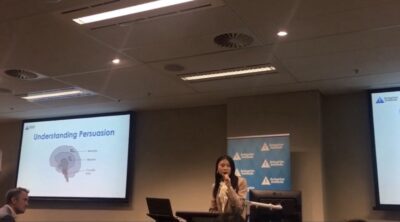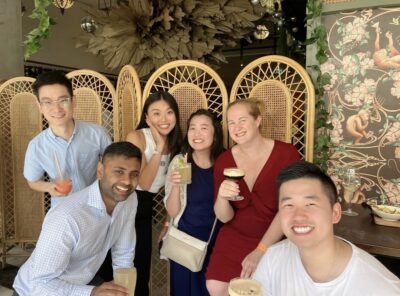
The Associate Edition: The Designer Actuary
In this edition, we chat to Constance, a Senior Actuarial Analyst at Matt Noyce Consulting. With a passion for fashion and interior design, Constance shares how her diverse passions and rigorous professional development have helped her shape an exceptional career.
Beyond the job title, who are you? We want to know the person behind the Associate!
At work, I am a Senior Actuarial Analyst at Matt Noyce Consulting. I enjoy pricing work and am passionate about enabling businesses to win through business strategies in multiple dimensions.
Working with different clients on a project basis, I provide technical and strategic pricing support and advice to our clients. Additionally, I’m always up for a fun chat and like to bring the good vibes to work!

Outside work, I love anything about art with my top two passions being fashion and interior design – I’m a fan of the minimalist fashion style and mid-century minimal and contemporary interior design.
I enjoy doing pilates as it keeps me active while challenging me mentally and physically, and watching fencing. I also enjoy cosying up in a corner reading a book, hanging out with my partner and mates at pubs, restaurants, bars and wine tasting!
Can you share your journey in becoming an Associate actuary?
I started the Associate program when I got my second actuarial job. I completed the Actuarial Control Cycle and Actuarial Data Analysis with Macquarie University and Communication, Modelling and Professionalism and Asset Liability Management with the Actuaries Institute.
If I had to list my key takeaways from becoming an Associate, I would say that I am more aware of the complexity in the business world and have a better understanding of the importance of competency, adhering to the Code of Conduct and business sense.
In the Foundation Program, I learnt fundamental technical knowledge and techniques for solving well-set and simplified risk problems. However, the problems are far from either well-set or simplified in the real business world. They are always complicated and need the doer’s professional judgement to filter and prioritise. The Associateship Program made me not only realise this, but more importantly, helped me understand the methodologies to deal with it.
Additionally, the Associateship Program is a great bridging program that prepares students for further development, given its specialised content in certain insurance areas.
What is the most rewarding aspect of being an Associate?

Becoming an Associate allowed me to gain certain knowledge and skills, which provided a solid support for my career. It pushed me to think critically and build foundations for further development in the wider business fields or for specialising in the insurance industry.
What advice would you give to those who are contemplating qualifying as an Associate?
If you want it, you’ll get it.
Over time, actuaries have demonstrated their skillsets and the value they bring in both traditional and non-traditional fields. Associate actuaries have shown their ability and competency to take on and master their roles in different departments and organisations.
Owning the title of ‘actuaries’, in this sense, comes with a halo in a business conversation, representing a beyond high standard of credibility, professionalism, and influence on senior stakeholders and in wider business fields.
So, stop hesitating, start building your knowledge base and enhance your competency in becoming that actuary!
How does being an Associate enhance your professional practice and development?
If the Foundation Program taught me techniques to solve well-set and simplified risk problems, the Associate Actuary Program enhanced my toolkit with the technical and analytical skills that are tailored to solve solutions for complex risk businesses.
The Actuary Program also includes well-rounded subjects that have helped me further my understanding of ethics and widen my horizon on emerging trendy fields, such as risk management and data science.
What has been the most important lesson you’ve learned or the biggest influence on your career and why?
Nothing is certain, but it can be certain to a degree.
One says: “actuaries make the uncertainty into the certainty”. However, in real life experience, we have also learnt that nothing is certain!
So, does that mean the expected skill is very much different from the actual life? Nope!

What an actuary really can do is to use their professional skills to bring certainty at a great degree of confidence level that is aligned with real life experience – we cannot 100% guarantee that, but we can give a 95% degree of confidence that we can get there.
Another important lesson I’ve learnt is the power of volunteering.
If you are in an early stage of your career, raising your hand to volunteer is a great opportunity to involve yourself in the loop, connect with peers and mentors, deepen your understanding of popular topics in the industry, and potentially unlock your next role.
What specific trends or technologies do you believe will shape the future of the actuarial profession in the next decade?
Machine learning and artificial intelligence.
One cannot mention one of the most popular technologies without machine learning or artificial intelligence. It brings both excitement and uncertainty to many industries including the actuarial profession. The excitement refers to the revolution and efficiency they bring, and the uncertainty is whether we will be replaced by them.
As much as I respect and utilise machine learning and artificial intelligence in my day-to-day work and personal life, I believe that there will always be roles for actuaries, who are able to:
- determine algorithms and train them to run results.
- make judgements on the reasonableness and validity of the outcomes generated by machine learning and artificial intelligence.
- perform risk management to control bias and enhance transparency.
If you could pick any superpower that would enhance your abilities as an actuary, what would it be and why?
The ability to switch between human being mode and AI mode like ChatGPT!
The reason is simple. If you are ‘scared’ of a black box and want to understand it, you go into it or become one so you can uncover the mystery behind it.
Sometimes curiosity kills the cat, but at other times, it is the thirst of the soul – the wick in the candle of learning and the intellectual virtue that leads us to success.
CPD: Actuaries Institute Members can claim two CPD points for every hour of reading articles on Actuaries Digital.






